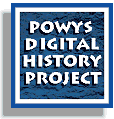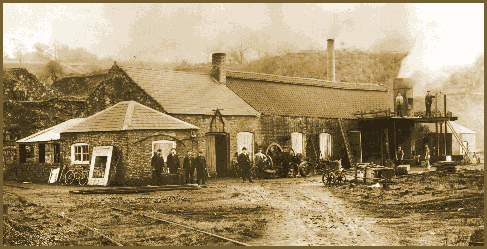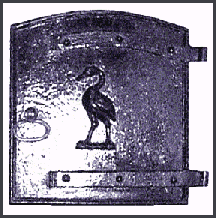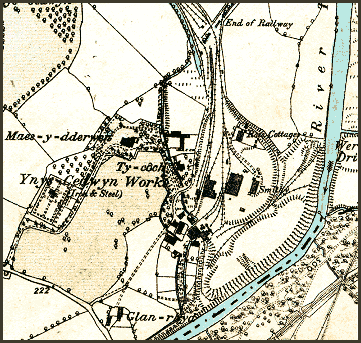
Upper Swansea Valley
The Story of Iron 6
by Len Ley
The Evans brothers foundry
at
Ynyscedwyn
Photograph from
the collections
of the late
John Morris

Brothers David and Thomas Evans took over the Ynyscedwyn site creating the Crane Iron Foundry at some time in the last quarter of the 19th century. This consisted of an iron foundry capable of producing castings of up to 2 tons and the iron was cast once a week Scrap metal was normally used and this was melted in a cupola furnace. Much of the work was for the local coal industry and mainly consisted of supplying tram wheels and rail points for the colliery tramways.
Cast iron door
with Crane motif
from Ynyscedwyn
foundry
By kind permission of Brecknock Museum
 At
the foundry, the Pattern Maker was the prime craftsman in the
production of metal castings. The art had progressed from the
early casting of pig iron to the more accurate clearances required
in the casting of the more refined metals. The pattern maker
would fashion the shape required, giving the pattern a slight
bevel that enabled it to be removed from the mould without disturbing
the sand. Somewhere close to the foundry had stood the Siop-y-Cwmni,
or company shop. This had been the Ynyscedwyn Truck Shop and
had sold everything from food to the final coffin. The church
records show that a William Petherick had been the grocer at
the works shop during the years after 1891.
At
the foundry, the Pattern Maker was the prime craftsman in the
production of metal castings. The art had progressed from the
early casting of pig iron to the more accurate clearances required
in the casting of the more refined metals. The pattern maker
would fashion the shape required, giving the pattern a slight
bevel that enabled it to be removed from the mould without disturbing
the sand. Somewhere close to the foundry had stood the Siop-y-Cwmni,
or company shop. This had been the Ynyscedwyn Truck Shop and
had sold everything from food to the final coffin. The church
records show that a William Petherick had been the grocer at
the works shop during the years after 1891.The Ynyscedwyn
site in 1887
Powys
County Archives

The map reproduced above is from an 1887 First Edition Ordnance Survey map, showing the canal and railway links, and the Glamorganshire border.
There are7 pages on The Story of Iron. Use the box links below to view other pages.